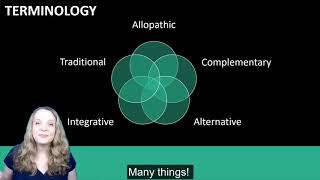Traditional, Complementary & Alternative Medicine: An Introduction to Terminology
Traditional, Complementary & Alternative Medicine: An Introduction to Terminology

***
This is a mini-lesson for the Botanical Medicine and Health course developed and taught by Dr. Cassandra Quave at Emory University in the Center for the Study of Human Health. Subscribe to the “Teach Ethnobotany Channel” to access updated educational materials on people, plants and health.
***
DISCLAIMER: Content provided in this video and the TeachEthnobotany YouTube Channel is for educational purposes only and should not be construed to be medical advice, diagnosis or treatment. This content is not a substitute for professional medical or healthcare advice, diagnosis or treatment, and may not be used for such purposes. The information about herbal medicines and drugs in this video and the TeachEthnobotany site is general in nature. It does not cover all possible uses, actions, precautions, side effects, or interactions of the medicines mentioned, nor is the information intended as medical advice for individual problems or for making an evaluation as to the risks and benefits of taking a particular drug or botanical/herbal medicine. Always seek the advice of your physician or other qualified health provider with any questions you may have regarding a medical question or condition.

Very interesting presentation, very illustrative… Thank you professor Quave.